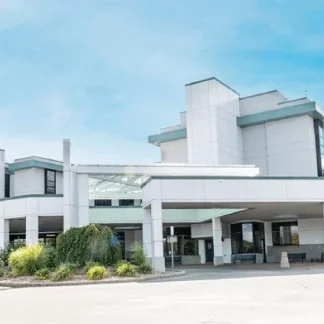DePaul - Halstead Square Community Residence
DePaul - Halstead Square Community Residence provides housing in a service-enric...
Unity Hospital of Rochester, New York, provides alcohol and drug rehab services to adolescents and adults. Inpatient treatment, outpatient treatment, and medication assisted treatment are offered. Those with dual diagnosis will be treated within each program.
Unity Hospital offers comprehensive addiction treatment that focuses on the whole person. Services include:
Inpatient This is a highly structured program for adults that lasts between 14 – 28 days on average. Individual therapy, group therapy, recreational therapy, and educational classes are provided. Additionally, goal planning, time spent in skills development classes, medication management services, and discharge planning are offered. Those with dual diagnosis will be provided mental health treatment while receiving addiction treatment.
Outpatient Individual therapy, group therapy, and family therapy are provided. A specialty track is available for adolescents. Additionally, the outpatient program offers an impaired driver program. Those with dual diagnosis will be provided mental health treatment while receiving addiction treatment.
Medication Assisted Treatment This program is for individuals who are appropriate for FDA-approved medications in combination with mental health therapy. Medications are prescribed to help manage withdrawal symptoms, reduce cravings, and to help stabilize the body.
Contact us for more information: (585) 723-7000

Connect with Unity Hospital - Rochester by calling their admissions team directly.
(585) 723-7000 Website Get DirectionsCognitive Behavioral Therapy (CBT) is a therapy modality that focuses on the relationship between one's thoughts, feelings, and behaviors. It is used to establish and allow for healthy responses to thoughts and feelings (instead of unhealthy responses, like using drugs or alcohol). CBT has been proven effective for recovering addicts of all kinds, and is used to strengthen a patient's own self-awareness and ability to self-regulate. CBT allows individuals to monitor their own emotional state, become more adept at communicating with others, and manage stress without needing to engage in substance abuse.
Dialectical Behavior Therapy (DBT) is a modified form of Cognitive Behavioral Therapy (CBT), a treatment designed to help people understand and ultimately affect the relationship between their thoughts, feelings, and behaviors. DBT is often used for individuals who struggle with self-harm behaviors, such as self-mutilation (cutting) and suicidal thoughts, urges, or attempts. It has been proven clinically effective for those who struggle with out-of-control emotions and mental health illnesses like Borderline Personality Disorder.
Group therapy is any therapeutic work that happens in a group (not one-on-one). There are a number of different group therapy modalities, including support groups, experiential therapy, psycho-education, and more. Group therapy involves treatment as well as processing interaction between group members.
In individual therapy, a patient meets one-on-one with a trained psychologist or counselor. Therapy is a pivotal part of effective substance abuse treatment, as it often covers root causes of addiction, including challenges faced by the patient in their social, family, and work/school life.
Dialectical Behavior Therapy (DBT) is a modified form of Cognitive Behavioral Therapy (CBT), a treatment designed to help people understand and ultimately affect the relationship between their thoughts, feelings, and behaviors. DBT is often used for individuals who struggle with self-harm behaviors, such as self-mutilation (cutting) and suicidal thoughts, urges, or attempts. It has been proven clinically effective for those who struggle with out-of-control emotions and mental health illnesses like Borderline Personality Disorder.
Group therapy is any therapeutic work that happens in a group (not one-on-one). There are a number of different group therapy modalities, including support groups, experiential therapy, psycho-education, and more. Group therapy involves treatment as well as processing interaction between group members.
In individual therapy, a patient meets one-on-one with a trained psychologist or counselor. Therapy is a pivotal part of effective substance abuse treatment, as it often covers root causes of addiction, including challenges faced by the patient in their social, family, and work/school life.
Group therapy is any therapeutic work that happens in a group (not one-on-one). There are a number of different group therapy modalities, including support groups, experiential therapy, psycho-education, and more. Group therapy involves treatment as well as processing interaction between group members.
In individual therapy, a patient meets one-on-one with a trained psychologist or counselor. Therapy is a pivotal part of effective substance abuse treatment, as it often covers root causes of addiction, including challenges faced by the patient in their social, family, and work/school life.
In individual therapy, a patient meets one-on-one with a trained psychologist or counselor. Therapy is a pivotal part of effective substance abuse treatment, as it often covers root causes of addiction, including challenges faced by the patient in their social, family, and work/school life.
DePaul - Halstead Square Community Residence provides housing in a service-enric...
Rochester Mental Health Center is a non-profit rehab located in Rochester, New Y...
Catholic Family Center is a faith based social services organization offering su...
Blake House is a rehab facility located in Rochester, NY. Blake House specialize...